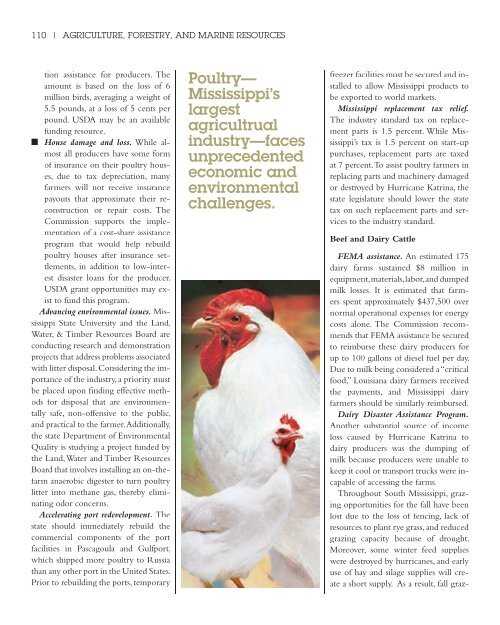110 | AGRICULTURE, FORESTRY, AND MARINE RESOURCEStion assistance for producers. Theamount is based on the loss of 6million birds, averaging a weight of5.5 pounds, at a loss of 5 cents perpound. USDA may be an availablefunding resource.■ House damage and loss. While almostall producers have some formof insurance on their poultry houses,due to tax depreciation, manyfarmers will not receive insurancepayouts that approximate their reconstructionor repair costs. TheCommission supports the implementationof a cost-share assistanceprogram that would help rebuildpoultry houses after insurance settlements,in addition to low-interestdisaster loans for the producer.USDA grant opportunities may existto fund this program.Advancing environmental issues. <strong>Mississippi</strong>State University and the Land,Water, & Timber Resources Board areconducting research and demonstrationprojects that address problems associatedwith litter disposal. Considering the importanceof the industry, a priority mustbe placed upon finding effective methodsfor disposal that are environmentallysafe, non-offensive to the public,and practical to the farmer. Additionally,the state Department of EnvironmentalQuality is studying a project funded bythe Land, Water and Timber ResourcesBoard that involves installing an on-thefarmanaerobic digester to turn poultrylitter into methane gas, thereby eliminatingodor concerns.Accelerating port redevelopment. Thestate should immediately rebuild thecommercial components of the portfacilities in Pascagoula and Gulfport,which shipped more poultry to Russiathan any other port in the United States.Prior to rebuilding the ports, temporaryPoultry—<strong>Mississippi</strong>’slargestagricultrualindustry—facesunprecedentedeconomic andenvironmentalchallenges.freezer facilities must be secured and installedto allow <strong>Mississippi</strong> products tobe exported to world markets.<strong>Mississippi</strong> replacement tax relief.The industry standard tax on replacementparts is 1.5 percent. While <strong>Mississippi</strong>’stax is 1.5 percent on start-uppurchases, replacement parts are taxedat 7 percent. To assist poultry farmers inreplacing parts and machinery damagedor destroyed by Hurricane Katrina, thestate legislature should lower the statetax on such replacement parts and servicesto the industry standard.Beef and Dairy CattleFEMA assistance. An estimated 175dairy farms sustained $8 million inequipment, materials, labor, and dumpedmilk losses. It is estimated that farmersspent approximately $437,500 overnormal operational expenses for energycosts alone. The Commission recommendsthat FEMA assistance be securedto reimburse these dairy producers forup to 100 gallons of diesel fuel per day.Due to milk being considered a “criticalfood,” Louisiana dairy farmers receivedthe payments, and <strong>Mississippi</strong> dairyfarmers should be similarly reimbursed.Dairy Disaster Assistance Program.Another substantial source of incomeloss caused by Hurricane Katrina todairy producers was the dumping ofmilk because producers were unable tokeep it cool or transport trucks were incapableof accessing the farms.Throughout South <strong>Mississippi</strong>, grazingopportunities for the fall have beenlost due to the loss of fencing, lack ofresources to plant rye grass, and reducedgrazing capacity because of drought.Moreover, some winter feed supplieswere destroyed by hurricanes, and earlyuse of hay and silage supplies will createa short supply. As a result, fall graz-
THE GOVERNOR’S COMMISSION REPORT | 111ing will be minimal, thereby furtherlimiting production. The Commission,therefore, recommends federal funding,which could mirror the provisionsof the dairy disaster assistance programset forth in the Military ConstructionAppropriations and Hurricane SupplementalAppropriations Act of 2005, asfollows: (1) farmers should be eligiblefor 50 percent of repair or replacementof uninsured losses to dairy operationsstructures at an assistance level not toexceed $250,000; (2) $1.5 million to assistdairy farmers in covering productionand spoilage losses; and (3) $13.6million to assist dairy producers withprolonged production decreases andexcessive costs incurred over the next12 months due to hurricane damage.Livestock Assistance Program. Feedshortages will be experienced throughout<strong>Mississippi</strong> in the coming months,causing farmers to incur increased coststo purchase feed. In order to partiallyrecover <strong>Mississippi</strong> livestock producerfeed losses, the Commission recommendsfederal funding in the amount of$17 million for the livestock assistanceprogram, which could mirror the provisionsof the dairy disaster assistanceprogram set forth in the Military ConstructionAppropriations and HurricaneSupplemental Appropriations Actof 2005. The program will allow producerswith 30 percent grazing/feedloss due to the hurricane to qualify fordirect payments.Catfish FarmingThe catfish industry has also beenaffected by Hurricane Katrina. Theweather conditions damaged the leveesused to ring the ponds and fostered thedevelopment of columnaris, a parasiticcondition facilitated by stress-inducedfactors. Farmers had difficulty in aeratingtheir ponds in the hot conditionsfollowing the hurricane. Other economiclosses were the result of increasedfuel costs to run generators and the inabilityof farmers to obtain feed. A totalof $17 million is required to addressthe needs of the catfish industry. TheCommission recommends that USDAappropriate supplemental funds to reimbursecatfish farmers for their lossessimilar to the previously funded CatfishFeed Assistance Program.Nursery Plants, Fruits andVegetablesIn large part, <strong>Mississippi</strong>’s nurseryindustry is located in the areas whichwere most severely affected by the hurricane.Significant portions of <strong>Mississippi</strong>’snursery sales are directed to localoutlets that have been temporarilyremoved due to hurricane damage. Asa result, the Commission recommendsthe following:■ Using the Nursery and TropicalFruit Producer Hurricane ReliefAct (H.R. 4031) to provide emergencyrelief to growers sufferinglosses from the hurricane. The Actcodifies the nursery disaster programimplemented in Florida due to theimpact of three hurricanes in 2004.Nursery producers in designatedPresidential Disaster Areas should besimilarly eligible to seek reimbursementof costs associated with debriscleanup and removal. The bill also includesa provision for a special inclusionin the Tree Assistance Programfor tree nursery growers, Christmastree growers, and tree seedling producers.■ Expanding provisions set forth inthe Florida Vegetable, Fruit andTropical Fruit Disaster Program authorizedwith Section 32 funds orreenacting it to apply to <strong>Mississippi</strong>fruit and vegetable producers’ lossesattributable to Hurricane Katrina.Tree, Vine, and Bush CropsHurricane Katrina caused tremendouscrop production losses, resulting in a needfor replanting. These include productsproduced on a vine, tree or bushes, includingpecans, blueberries, muscadines,and peaches. An estimated $5.3 millionis needed to assist these growers.The Commission recommends that,through the Tree Assistance Program,authorized in the Farm Security andRural Investment Act of 2002, Congressprovide funds to assist producers. Underthis program, producers are eligiblefor assistance if they suffered at least 15percent mortality. Eligible producerscan be reimbursed for 75 percent of thetotal cost of replanting with maximumpayments of up to $75,000 under theprogram.Marine ResourcesHurricane Katrina dealt a devastatingblow to the beautiful <strong>Mississippi</strong>Gulf Coast, including its fish resourcesand industries and its highly productivecoastal marshes and estuaries. The entire<strong>Mississippi</strong> coastline was subjectedto the most damaging portion of thestorm, being situated in the northeastquadrant.The Category 4 winds battered thecoastline for 12 hours, causing an unprecedentedstorm surge ranging from15 to 35 feet. The loss of fish and shellfishnursery habitat, fisheries-relatedjobs, and fisheries infrastructure, includingboat dockage, public access, and seafoodprocessing capacity will obviouslyhave a long-term adverse impact to thearea’s economy. Its economic impact,however, may be shortened with imme-




